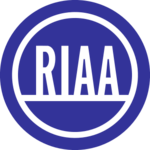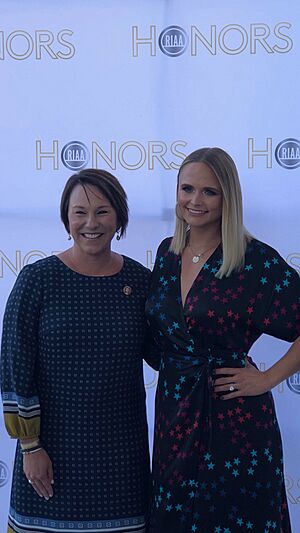Recording Industry Association of America facts for kids
 |
|
| Abbreviation | RIAA |
|---|---|
| Formation | 1952 |
| Type | Licensing and royalties, technical standards |
| Headquarters | Washington, D.C., U.S. |
| Location |
|
|
Chairman and CEO
|
Mitch Glazier |
The Recording Industry Association of America (RIAA) is a group that represents the U.S. music recording industry. Its members are big record labels and companies that make and sell music. The RIAA says its members create and sell about 85% of all legal music in the United States. The RIAA's main office is in Washington, D.C..
The RIAA started in 1952. Its first goals were to manage fees for music copyrights, work with music unions, and study how government rules affected the music business. Early RIAA standards helped set how records were made, like the size of 33 1/3, 45, and 78 rpm records.
Today, the RIAA works to protect the rights of artists and their music. This includes making sure artists' creative works are not used without permission. They also do research about the music industry and watch new laws to speak up for music companies.
The RIAA also helps manage the rights for sound recordings. It is famous for giving out Gold and Platinum awards to albums and singles that sell many copies in the United States. This award system was the first of its kind and became a model for music awards around the world.
Contents
How the RIAA Works
Mitch Glazier has been the RIAA's leader since 2019. He has worked with the RIAA for over 20 years. He helped the music industry change to streaming music, where people can listen to music "anywhere, anytime."
The RIAA represents more than 1,600 music labels. These are private companies like record labels and distributors. Together, they create and sell about 90% of the recorded music in the United States. The biggest and most important members are often called the "Big Three":
These major music groups include well-known record labels such as Atlantic, Capitol, RCA, Warner, Columbia, and Motown.
The RIAA reported that the total value of music sold by its members was $10.4 billion in 2007. This was less than the $14.6 billion sold in 1999. However, by 2016, money from recorded music sales in the U.S. grew to $7.7 billion.
Music Awards and Certifications
The RIAA has an award program for music that sells a lot of copies. This program started in 1958.
Gold and Platinum Awards
When the awards first began, a Gold single meant one million copies sold. A Gold album meant $1 million in sales. In 1975, a Gold album also needed to sell 500,000 copies.
As music sales grew, the Platinum award was added in 1976. A Platinum album meant one million copies sold, and a Platinum single meant two million copies sold. The Multi-Platinum award was added in 1984 for even higher sales. In 1989, the sales needed for singles were lowered to 500,000 for Gold and 1,000,000 for Platinum. This was because fewer singles were being sold.
In 1992, the RIAA started counting each disc in a multi-disc set as one unit. In 1999, the Diamond award was created for albums or singles that sold ten million copies. Because of these changes, the sales level for an award depends on when it was given.
Since 2000, the RIAA also has a similar award program for Latin music. It is called Los Premios de Oro y De Platino. A "Disco De Oro" (Gold) is given for 30,000 units. A "Disco De Platino" (Platinum) is for 60,000 units. The "Album Multi-Platino" is for 120,000 units, and "Diamante" is for 600,000 units. The RIAA says "Latin music" means a release where 51% or more of the content is in Spanish.
Digital Music Awards

In 2004, the RIAA started giving awards for "digital" recordings. These are recordings sent over a network, like those bought from the iTunes Store. In 2006, "digital ringtones" were added.
Since 2013, streams from music services like Spotify, Napster, and YouTube also count towards certification. The RIAA counts 100 streams as equal to one download. This means RIAA awards for singles now include streams, not just direct sales. In the same year, the RIAA started the Latin Digital Award for digital recordings in Spanish.
As of 2016, the rules for these digital awards are:
- Gold: 500,000 units
- Platinum: 1,000,000 units
- Multi-Platinum: 2,000,000 units (and then 1,000,000 more for each new level)
- Diamond: 10,000,000 units
Here is how units are counted:
- A permanent digital download counts as 1 unit.
- 150 on-demand audio or video streams count as 1 unit.
For Latin digital awards:
- Disco de Oro (Gold): 30,000 copies
- Disco de Platino (Platinum): 60,000 copies
- Disco de Multi-Platino (Multi-Platinum): 120,000 copies
Album Awards
In February 2016, the RIAA updated how it gives album awards. It now combines streaming and track sales.
- Gold: 500,000 units
- Platinum: 1,000,000 units
- Multi-Platinum: 2,000,000 units (and then 1,000,000 more for each new level)
- Diamond: 10,000,000 units
For album awards, each unit can be one of these:
- A sale of a digital album or a physical album.
- 10 track downloads from the album.
- 1,500 on-demand audio or video streams from the album.
Video Longform Awards
Another type of music release is called "video longform." This includes DVD and VHS releases. Some live albums and compilation albums also count here. The rules for these awards are a bit different.
- Gold: 50,000 copies
- Platinum: 100,000 copies
- Multi-Platinum: 200,000 copies
Stopping Unauthorized Music Sharing
The RIAA works to stop people from sharing its members' music without permission. Studies have looked at how much money is lost when music is downloaded illegally.
The RIAA has taken legal action against services that allow file-sharing. They have also sued individuals who they believed were sharing files. In late 2008, the RIAA said it would stop suing individuals. Instead, it would work with internet providers to use a "three-strike system." This system would give two warnings for file sharing and then cut off internet service after a third warning.
The RIAA identifies people based on their internet address. They usually offer a chance to settle before a lawsuit is officially filed. This often means paying money to the RIAA and agreeing not to share music illegally.
The Electronic Frontier Foundation and Public Citizen are groups that believe people should not lose their privacy online without a chance to argue in court. Sometimes, the RIAA's methods of finding users have led to mistakes, like sending notices to people who were not able to share files.
In 2007, the RIAA started sending letters to internet users. These letters accused them of sharing files and told them how to make a "discount" payment online. The letters said that if people did not settle, lawsuits would be filed against them. These payments were usually between $3,000 and $12,000.
The RIAA also started a program for internet providers and colleges. It asked them to send letters to their users and students. These letters offered early settlements before their identities were fully known.
The RIAA has taken legal action against various companies and services over the years. For example, in 1998, they sued Diamond Multimedia over their Rio PMP300 player. The court ruled in favor of Diamond, which helped the portable digital music player market grow.
In 2003, the RIAA sued college students who created LAN search engines like Phynd and Flatlan. In 2003, they also sued individuals who shared many files using Kazaa. Most of these cases were settled with payments. In 2006, the creators of Kazaa agreed to pay $115 million to the RIAA and add filters to their network to stop sharing of copyrighted music.
The RIAA also took legal action against XM Satellite Radio in 2006. They wanted to stop XM subscribers from recording songs from satellite broadcasts. XM was later required to add a fee for subscribers, which is paid to the RIAA.
In 2007, the RIAA sued Usenet.com, saying the company was helping with unauthorized music sharing. The RIAA won this case in 2009. In 2010, RIAA members won a case against LimeWire, another file-sharing network. After this, the RIAA's website was temporarily taken offline by groups like Operation Payback and Anonymous.
Talking to the Government
The RIAA talks to the government about laws that affect music. In 2025, the RIAA increased its efforts to speak with lawmakers. This was to address how artificial intelligence might affect creative work and to make sure copyright is protected online. They spent more than $2.5 million in the first three months of 2025 on these efforts.
Disagreement Over Music Rights
In 1999, there was a disagreement about who owned the rights to music recordings. A lawyer working for Congress added a change to a copyright law. This change would have made many music recordings "works made for hire." This meant that record labels, not the artists, would own the copyrights. The RIAA supported this change. However, artists formed a group called the Recording Artists' Coalition and successfully worked to have the change removed.
Online Platform Requests
On October 23, 2020, the website GitHub received a request from the RIAA. The RIAA asked GitHub to remove an open-source software project called youtube-dl. This tool could be used to download videos, and the RIAA said it violated copyright law. Some people argued that the tool could also be used for good reasons, like saving videos about social issues.
On February 4, 2022, the RIAA quickly took action against a website called HitPiece. This site was accused of taking music without permission to sell as NFTs (Non-Fungible Tokens). HitPiece's website has not been updated since.
Leaders of the RIAA
- Goddard Lieberson, 1964–1972 (president)
- Stanley Gortikov, 1972–1987 (president)
- Jay Berman, 1988–1998 (president and chair)
- Hilary Rosen, 1998–2001 (president)
- Mitch Bainwol, 2003–2011 (chairman and CEO)
- Cary Sherman, 2011–2019 (chairman and CEO)
- Mitch Glazier, 2019–present (chairman and CEO)
See also
 In Spanish: Recording Industry Association of America para niños
In Spanish: Recording Industry Association of America para niños
- RIAA equalization (RIAA curve)
- Center for Copyright Information
- Federal Communications Commission
- Global music industry market share data
- International Intellectual Property Alliance
- Music Canada
- Parental Advisory
- Strategic lawsuit against public participation
 | Emma Amos |
 | Edward Mitchell Bannister |
 | Larry D. Alexander |
 | Ernie Barnes |

